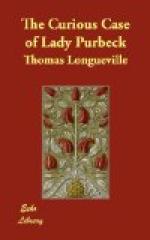It may be a question whether Lady Purbeck ever intended “to put herself into some monastery,” in the sense of becoming a nun. She did, however, put herself into a monastery in a very different way. It was, and still is, the custom in some convents to take in lodgers or boarders, either for a short time, for a long time, or even for life. The peace, the quiet, the regularity, and the religious services and observances at such establishments are attractive to some people, especially to those who are in trouble or difficulty. The disadvantages are that, although the lodgers are perfectly free to go where they please and to do what they please, they can generally only get their meals at rigidly appointed hours, that the convent doors are finally closed at a fixed time, usually a very early one; and that after that closing time there is no admittance. Practically the latter arrangement precludes all possibility of society in an evening, and the present writer knows several Catholics of the most unimpeachable orthodoxy, zeal, piety and virtue, who have tried living in convents and monasteries, as boarders, both in Rome and in London, and have given it up simply on account of those inconveniences. It was, therefore, very unjust to speak ill of Lady Purbeck for not having lived in a convent “according to that strictness as was expected,” because she left it. But this was done in the following letter:[97] “The Lady Purbeck is come forth of the English Nunnerie. For, the Lady Abbess being from home, somebody forgott to provide the Lady Purbeck her dinner, and to leave the roome open where she used to dine at night, expostulating with the Abbess, they agreed to part fairely, which the Abbess was the more willing unto in regard the Lady Purbeck did not live according to that strictness as was expected. Car. Richelieu helped her into the Nunnerie.”
It may be inferred from this letter that Lady Purbeck left the convent for the simple reason that she was not comfortable in it—even the “superlatively virtuous” do not like to be dinnerless—and that, either because she was unpunctual, or because she was inclined to make complaints, the Abbess was relieved when she took her departure. But by Scudamore’s own showing they parted “fairely;” or, as we should now say, good friends.
Among Sir Kenelm Digby’s English correspondents, while he was in Paris, was Lord Conway, a soldier as devoted to literature as to arms, and a general who always seemed fated to fight under disadvantages. Shortly after the time with which we are at present dealing, he was defeated when in command of the King’s troops at Newcastle. Meanwhile, Sir Kenelm was endeavouring to “fit him withal,” in the matter of “curious books,” from Paris. As the letter[98] from Sir Kenelm to Lord Conway, about to be quoted, has something in it about Lord Wimbledon, it may be well to note that he was a brother of Lady Elizabeth Hatton and therefore an uncle of Lady Purbeck.




